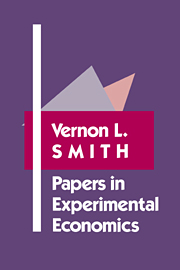Book contents
- Frontmatter
- Contents
- Preface
- Acknowledgments
- Part I The Formative Years
- Part II Institutions and Market Performance
- Part III Public Goods
- Part IV Auctions and Institutional Design
- Introduction
- 25 Incentives and Behavior in English, Dutch and Sealed-Bid Auctions
- 26 Theory and Behavior of Single Object Auctions
- 27 A Test that Discriminates Between Two Models of the Dutch-First Auction Non-Isomorphism
- 28 Theory and Behavior of Multiple Unit Discriminative Auctions
- 29 Theory and Individual Behavior of First-Price Auctions
- 30 A Combinatorial Auction Mechanism for Airport Time Slot Allocation
- 31 Designing ‘Smart’ Computer-Assisted Markets
- PART V Industrial Organization
- Part VI Perspectives on Economics
27 - A Test that Discriminates Between Two Models of the Dutch-First Auction Non-Isomorphism
Published online by Cambridge University Press: 06 July 2010
- Frontmatter
- Contents
- Preface
- Acknowledgments
- Part I The Formative Years
- Part II Institutions and Market Performance
- Part III Public Goods
- Part IV Auctions and Institutional Design
- Introduction
- 25 Incentives and Behavior in English, Dutch and Sealed-Bid Auctions
- 26 Theory and Behavior of Single Object Auctions
- 27 A Test that Discriminates Between Two Models of the Dutch-First Auction Non-Isomorphism
- 28 Theory and Behavior of Multiple Unit Discriminative Auctions
- 29 Theory and Individual Behavior of First-Price Auctions
- 30 A Combinatorial Auction Mechanism for Airport Time Slot Allocation
- 31 Designing ‘Smart’ Computer-Assisted Markets
- PART V Industrial Organization
- Part VI Perspectives on Economics
Summary
Previous experiments reject the hypothesis that the Dutch and first auctions are isomorphic. Two alternatives to the standard normal form analysis of the Dutch auction are formalized: (1) bidders violate Bayes' rule, (2) bidders experience a utility of suspense that is additive with the utility of monetary reward. Paired comparisons of bidding behavior between groups in which the treatment is to triple the payoff of the baseline group yields no significant effect of this treatment. We therefore reject the utility of suspense model.
Introduction
The isomorphism of the Dutch and first price auctions was a standard part of received bidding theory beginning with the 1961 paper by Vickrey. This isomorphism follows from the assumption that bidding theory can be based on the normal forms of bidding games, rather than on their extensive forms. Cox, Roberson and Smith (hereafter CRS) presented the results of experiments which showed that the Dutch and first price auctions are not behaviorally isomorphic. Hence, this testable implication of the normal form representation is inconsistent with empirical observations.
CRS also provided two possible explanations of the failure of the predicted isomorphism. One explanation was based on the utility of playing the Dutch auction ‘waiting game’. The other explanation was based on bidder violation of Bayes' rule. The present paper reports the results of experiments that discriminate between the two competing explanations.
- Type
- Chapter
- Information
- Papers in Experimental Economics , pp. 580 - 594Publisher: Cambridge University PressPrint publication year: 1991
- 1
- Cited by



